
 |
 |
 |
 |
 |
 |
 |
 |
 |
 |
 |
 |
Games O' Canada - Pitfall
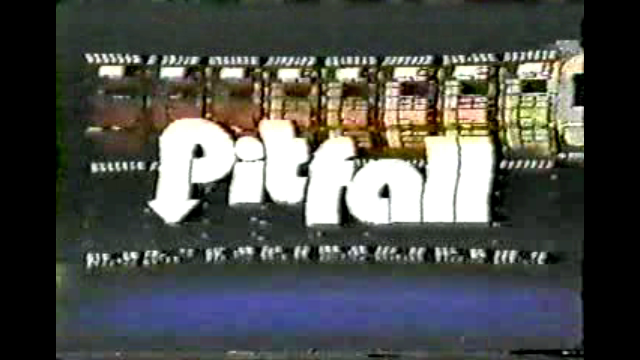
Syndication: September 14th, 1981 - September 1982
Hello Fans and welcome to The Games O’Canada, I’m Marc Power. Last time out, We talked about the first good show to be mentioned on Games O’ Canada: The Mad dash. A show that succeeded despite a low budget thanks to a fun game with variety and a strong host. The show we’ll be talking about this time, Had a strong host, a functional game and a respectful budget. But backstage problems doomed it to failure. It’s time to talk about Pitfall.

Pitfall aired from 1980-1981 across the Global networks in Canada. The host
is a familiar face to both US and Canadian television: Alex Trebek. Alex does
his usual grade A performance here which makes the show’s
backstage issues even more disappointing (stay tuned....). The announcer
is John Barton who pulls double duty as one of the executive producers of the
show. It’s his only announcer’s credit and he does an alright job. The set is
great for it’s era with a futuristic motif and the elevators used in the bonus
round
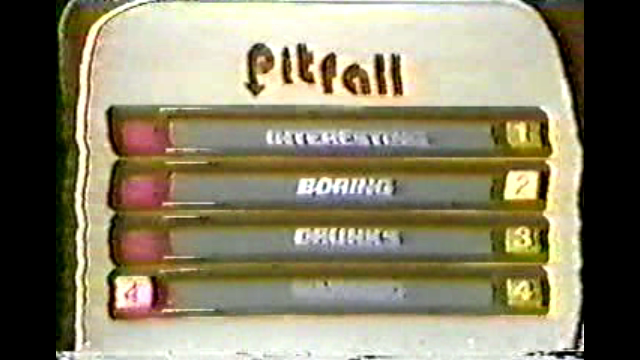

The main game is a simple survey game and it’s pretty dull, A question is
asked to the audience and 4 answers are posted. The audience votes using
electronic keypads and each contestant in turn chooses what they think will be
the most popular answer (alternating going 1st and 2nd).
If successful they score a point. They also earn a pit pass for points 1, 3 and
5 for use in the bonus round should they get there. The first to 5 points or
whoever is in the lead once 5 minutes expires (which is what happens more often
than not with only enough time usually for 5 or 6 questions) wins and moves on
to the pitfall round.
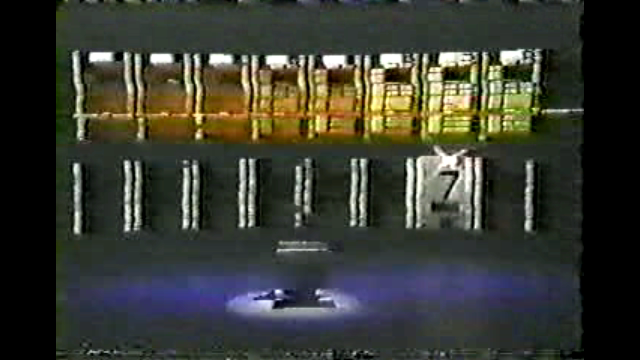
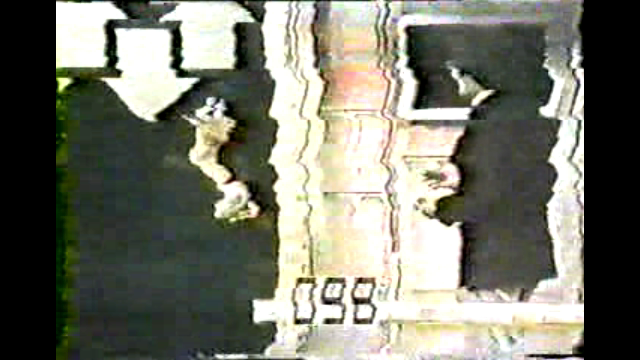
The Pitfall round is played on a massive bridge consisting of 8 elevators
(plus another one that will bring them up there), The game is played in 2 parts,
First off the contestant watches a light show, during which each of the 8
sections of the bridge are lit at random with the 5 safe sections each lighting
up once, however 3 sections are “pitfalls” which light up twice during the
sequence. The contestant then chooses their pit passes picking passes for the
sections they believe are pitfalls. After going up an elevator the game begins.
100 seconds are put on the clock and Alex starts firing general knowledge
questions, a correct answer means the contestant moves forward one space, If the
section is safe they win $100 and continue. If the section is a pitfall the
elevator will bring them down to the lower floor (costing them about 10 seconds
or so) and in order to continue (and get credit for that section) they need to
answer another question. When this happens the clock is temporarily stopped
while the elevator brings them back up. If the contestant reaches a section for
which they have a pass, they must give the pass to Alex and when they do, they
get to skip it and go to the next section. Although Alex tries to remember which
passes the contestant has, it’s ultimately the contestant’s responsibility so
there have been many cases where a contestant forgets to give Alex the pass,
when this happens the pass is considered “wasted”. If the contestant clears the
bridge before the clock runs out they win a prize package worth over $5,000
(Surprisingly big money for a Canadian show from that era). Later in the run the
payouts were tweaked, so that once the contestant reached the halfway point
(section 4) they won a small prize worth about $500 and clearing the bridge won
a prize package worth $2,500. Seems like they realized the bonus game was too
easy to win for such a huge prize, think about it, even if you managed to fall
victim to all 3 pitfalls that would still leave you about 70 seconds to answer
11 questions minus which is a bit tough
but still very doable and that pretty much never happened. Uh.....Catalena
Productions???.....maybe you should have tested that.....
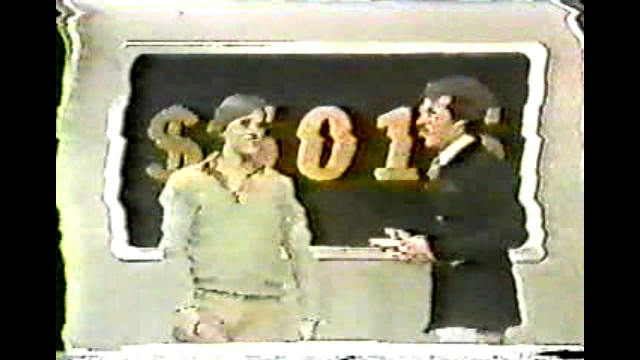

Okay, it’s a gimmicky game and the main game and bonus game have nothing to
do with each other so there’s a bit of a disconnect there, but it’s functional
and it was pretty popular in Canada for the 26 weeks it lasted.
So,
You’ve got a great host, an alright announcer, swanky looking set, a good prize
budget and a functional game (even if the main game and bonus round have nothing
to do with each other). So why only 26 weeks? The answer: The production
company.
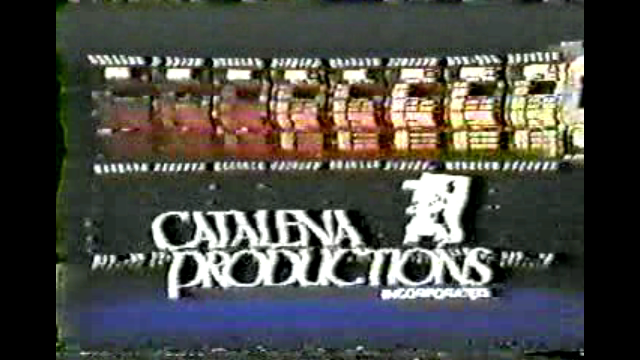
Catalena Productions produced Pitfall with Rhodes Productions distributing
it. Catalena’s only other venture in the game show world was a short-lived
Canadian version of let’s make a deal. That version flopped largely because
someone had the bright idea to give the contestants the choice of taking their
winnings in Canadian or US dollars. I don’t mean Canadian/US equivalent. I mean
“would you like $500 US or $500 Canadian?”. Since us Canucks aren’t stupid and
know a US dollar is more valuable than a Canadian dollar all but 1 contestant
took the US money, putting the show WAY over budget. Catalena had hoped Pitfall
would help get them out of the pitfall into financial ruin. But instead, it only
put them further in debt and by the time Catalena filed for bankruptcy they had
amassed millions in debt. This had a detrimental effect on the show. Several
contestants never got their prizes or settled for lesser prizes. For instance a
former multi-time pitfall champion the late Eileen Muntz claimed in an interview
the only prize she received was a trip to Paris...sort of, she got hotel
accommodations and meals but had to arrange her own airfare. Luckily she and her
husband were able to score free airfare as her husband (a licensed pilot)
arranged to “deliver” a small plane to Paris.
Alex however, arguably
suffered the worst and the show is still a sore subject that he has spoken about
several times. During the interview portion of an episode Jeopardy, One
contestant said he was a fan of Pitfall only for a annoyed looking Alex to
respond that he hated it because it’s the only time in his career he was ever
stiffed for pay. In an interview with
American Television Archives Alex spoke at lengths about the experience, Alex
was offered the job and accepted, he was sent a contract to sign and noticed a
clause that said he had to be a member of ACTRA (basically the Canadian
equivalent of the Screen Actor’s Guild) and he was, so that wasn’t an issue
until when he arrived in Vancouver to begin to work on the show and ACTRA
advised him, that he couldn’t work for Catalena Productions because they weren’t
“signatories” (I assume this means they weren’t registered with ACTRA). Alex was
thrown for a loop thinking they couldn’t legally put such a clause in the
contract. Alex explained the problem to producers and tried to back out, but
Catalena held Alex to the contract and threatened to sue him if he failed to
honour it. So Alex’s situation was: Do the show, get in beaucoup trouble with
ACTRA and probably wreck his career or don’t do the show get sued by a producer,
develop a reputation as unreliable and ruin his career.
After much arguing back and forth at the
eleventh hour the matter was settled by all parties and Alex was cleared to
host. According to Trebek after the first 13 weeks worth of shows were taped he
was paid for those, But they taped a second set of 13 weeks of shows and they
issued him a cheque but it bounced both times he tried to cash it. Alex
contacted ACTRA for assistance and they advised him there was nothing they could
do. Frustrated, he considered legal action, But after consulting a lawyer Alex
discovered what ACTRA meant and why there was nothing they could do. Catalena
Productions was bankrupt and in terms of a priority list of who was to be paid
first, at the top of the list was a mechanic who was responsible for maintaining
and repairing the elevators used on the show. This mechanic realizing how
important his job was to the show, commanded a ridiculous salary and once the
financial problems of the company came to the forefront he successfully filed a
lien against the show keeping the episodes from going to air until he got paid
in full. Alex wanted to do the same, but didn’t have that kind of leverage
because he was pretty much at the bottom of the list. (They really valued him as
a host clearly....) Alex has kept the bounced cheque on a plaque on a wall in
his home office as a souvenir. Alex seems bitter about it and after hearing his
story it’s understandable why. Turns
out this came at very low point in Alex’s life, He had recently gotten divorced
and was left without a dime to his name and even had to resort to borrowing
money from his ex to make ends meet and his father was terminally ill with
cancer and passed away not long after Pitfall was cancelled. What a disgusting
thing to do on Catalena’s part by only adding to Alex’s misery not only stiffing
him for the pay but for nearly ruining his reputation with ACTRA because these
guys didn’t know what the hell they were doing! One source claims they tried to
buy time by getting Alex to agree to deferred payments telling him it was for
tax purposes which was clearly just a lie. I’ve got news for you, not paying an
employee and lying about it is not only morally wrong and illegal, it’s a
colossal dick move! Moral of the Story:
If you’re going to produce a game show, make sure you have the money to run it
and not just stiff the host, the contestants and who knows how many others. Alex
has called Pitfall “one of the great tragedies of (his) life”
and he’s right. Pitfall was a show with
flaws but not the worst thing ever and it could have run a couple of years had
it been better funded. What it does do is
clear up a mystery for us fans as to how Alex got roped into hosting the AWFUL
GSG inductee Malcolm pilot and the awful M’ama Non M’ama pilot (IMO a deserved
future inductee) soon after.....He needed the money.
Alex would limp
around for a bit with unsold pilots and 2 short-lived series of battlestars
before 1984 when the call came from Merv Griffin to host Jeopardy but even then,
it took a little while for it to catch on, But like the true professional he is,
he trudged on and now Jeopardy is one of the world’s most popular television
staples and Alex continues to helm the show to this day some 34 years later and
picked up other jobs along the way like Classic Concentration and a short run on
To Tell The Truth, long time host of the National Geographic Bee and several
guest spots on sitcoms and in movies proving he is now a pop culture icon and
stands arguably as the most famous host from Canada in Television history with a
star on both the Hollywood walk of fame and Canada’s walk of fame, 5 Outstanding
game show host Emmys, a lifetime achievement Emmy, Holding the Guiness World
Record for most episodes hosted of the same game show (even passing Bob Barker’s
legendary tenure on The Price is Right) and being named an officer of the Order
of Canada. and even at nearly 80 years old doesn’t seem to be showing any signs
of slowing down. It’s goes to show
you that when life throws you lemons, make lemonade and things will work out.
Next time on the Games of Canada, We’ll talk about a comedy game show
that producers warned could cause you to die from laughing: The Joke’s On Us.
Until Then, I’m Marc Power: watch your step!
Have any questions about the site? Submit them to us via our Facebook page, our Twitter, and through e-mail. We'll be sure to answer them to the very best of our ability.
(c) 2009-2018 - A CQS Production.

Help GSG pay some bills!